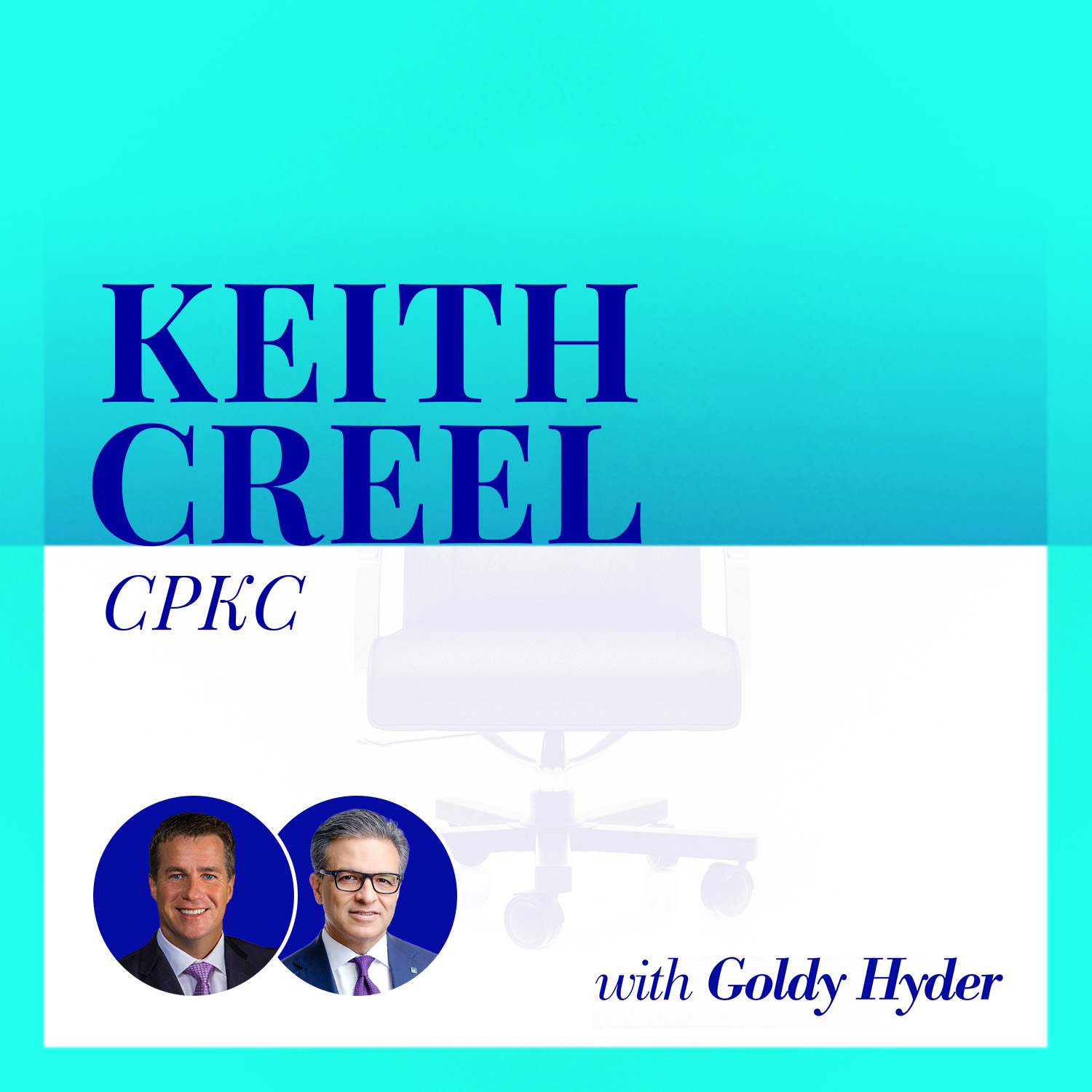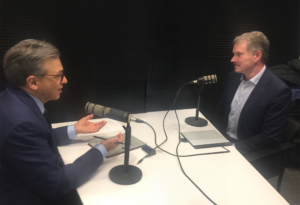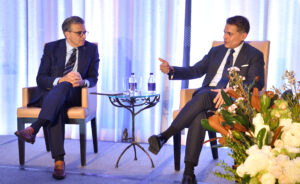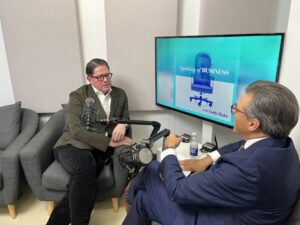When the last spike was driven into the Canadian Pacific Railway track on November 7th, 1885 in British Columbia, CP became the first transcontinental railway to connect Canada from east to west.
Last April, the iconic Canadian company marked another first, when – in Kansas City, Missouri – a ceremonial final spike connected Canadian Pacific with Kansas City Southern. The new railway, now named CPKC, became the first and only single-line railway connecting Canada, the United States and Mexico. It stretches across more than 32,000 kilometers of track and employs 20,000 people.
“This company is not new to change,” says Keith Creel, CPKC President and CEO. “We’re ready for it and we’re going to embrace it and unlock some unique opportunities that our network has created for us.”
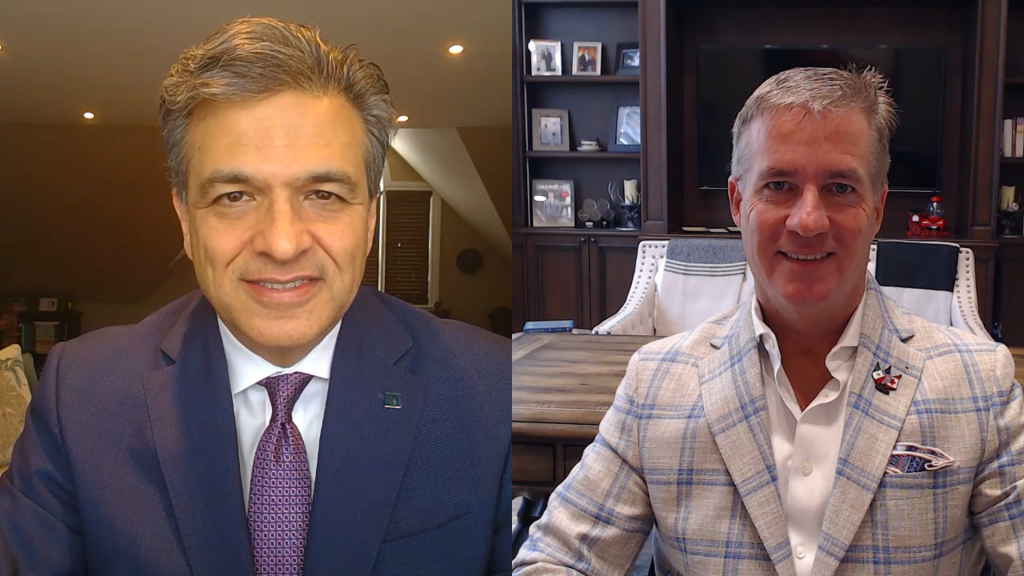
In an interview with Goldy Hyder on the Speaking of Business podcast, Creel discusses the benefits of the new North American line and delves into some of the challenges of operating across three countries.
“We’re going to celebrate the things that are similar, we’re going to recognize the differences, we’re going to never compromise our principles and we’re going to create a common culture that I call a constant pursuit of safety and operational excellence,” he says.
Listen to the full interview, including what military service taught him about leadership, on the Speaking of Business podcast.
Keith Creel:
The way I found my entire career; be transparent, be honest, be respectful. And if you’re all three of those, it’s going to lead you to the best outcome.
Goldy Hyder:
Welcome to Speaking of Business, conversations with Canadian innovators, entrepreneurs and business leaders. I’m Goldy Hyder, president and CEO of the Business Council of Canada. On November 7th, 1885 in British Columbia, the last spike was driven into the Canadian Pacific Railway track. The transcontinental railway was the first to connect Canada from east to west, and just last year, another first for the iconic Canadian company. On April 14th, 2023 in Kansas City, Missouri, a ceremonial final spike connected Canadian Pacific with Kansas City Southern. The new railway, now named CPKC, became the first and only single-line railway connecting Canada, the United States, and Mexico. It stretches across more than thirty-two thousand kilometers of track and employs 20,000 people. Overseeing it all is Keith Creel, CPKC’s President and CEO. I’m so thrilled that Keith is joining me today to talk about this journey. Welcome to the podcast Keith, and given it’s January the 9th, not too late to say Happy New Year still.
Keith Creel:
Well, Happy New Year, Goldy, and thank you for the opportunity to join you today. It’s always an honour and pleasure to talk about our story at CPKC.
Goldy Hyder:
Well look, I’m looking forward to the conversation, not just about the company but your own story as well. And here we are at the beginning of the year. How are you feeling about 2024, looking forward?
Keith Creel:
We’re energized and ready to get moving. I think, obviously a lot of things are changing in the world, and will continue to change, but this company is not new to change. We’re ready for it and we’re going to embrace it and unlock some unique opportunities that our network has created for us.
Goldy Hyder:
Well, speaking of change, I mentioned it in my introduction. I mean, a very significant milestone event took place and that was the merger that allowed you to claim the mantle of being the only North American rail line from the entire continent here. And a lot goes into that and I know that it’s so much about not the math, but it’s about the softer stuff and I know you put a lot of emphasis on culture. How are you going to make this work?
Keith Creel:
I think you’ve captured the foundation of it, Goldy. Culture is key. I think I’ve heard people say that culture will eat strategy for breakfast, and I would not disagree because if I think about my 32 years of experience and if I had any success, it is through the people that I’ve been able to serve and work with and the culture we’ve been able to create. It’s the same culture that allowed us to create some success in another railroad that I had some experience with in Canada, and it’s what led me to CP, and ultimately our journey to combine with the KCS. So you’ve got two companies, two similar but also unique cultures. And in fact, I would say three because we’re not just connecting two countries, we’re connecting three nations. So literally, the culture is key.
What we’ve approached it with, and listen, we haven’t gotten it all right, but in the very beginning I said, listen, we’re going to celebrate the things that are similar. We’re going to recognize the differences. We’re going to never compromise our principles and we’re going to create a common culture that I call a constant pursuit of safety and operational excellence. And we said that from day one, unlike maybe some mergers, the period of time it took to get these two companies together was quite enormous.
History will show the longest it’s ever taken to combine two railroads. So this process was about a three-year process, had a lot of time leading to purchasing the company, and putting in trust and then 18 or 19 months after, so we had a lot of time to think about this, and to prepare for this, and that’s something that we committed ourselves to was to integrate well, and it started with culture. So that’s what we focused on. We’re nine months into it.
We’re keeping our commitments to our customer, the regulators, the communities we operate in and through and our industry has not been very favorable when it comes to consolidations. There’s only been one or two.
Goldy Hyder:
Why do you think that is?
Keith Creel:
Just the complexity of it. Maybe underestimating, in all honesty. Previous leaderships underestimating the complexity of it. I know that the experience that I had in a previous consolidation at that other railroad went extremely well because we focused on best practices.
We didn’t try to boil the ocean, we ran a stable network, we didn’t try some huge quantum leap when it comes to systems. So a lot of that history and experience that I’ve walked through in my 32 years in this industry as well as a lot of other industries we studied, prepared us for integrating well and making sure that number one, it starts with culture, but number two, you’ve got to run a stable railroad when you first integrate, you can’t boil the ocean, you can’t make it more complicated than it is.
The complexity will come. So we’ve been very methodical. We moved very slowly. We focused on the people, we focused on our customers. We focused on running a stable railroad and it has worked extremely well for us so far, and we’re beginning to gain a tremendous amount of operating rhythm that’s proving extremely well as we move into ’24 so that we can grow and keep the commitments to our shareholders and to the nations that we said we’re bringing these two railroads together and that’s to drive a very unique growth connecting in a trilateral way, these three economies of these three great nations.
Goldy Hyder:
A year ago, you and I were in Mexico City together at the North American Leaders’ Summit, and a big part of the message that was coming out of there was the notion of Team North America, the idea that North America needs to compete, not with itself as much as it needs to compete with the rest of the world. How does this particular unification of these two companies allow North America to do that, and what do you need to do to make sure that that potential is realized? Because it’s one thing on paper, it’s another thing to make it happen.
Keith Creel:
Yeah, I think it enables it, in all honesty, it’s not a concept. These are core physical assets in the ground that create a network work that physically connect all three nations going across multiple border points, serving multiple ports, in Canada, U.S. as well as Mexico.
So to have the hardened infrastructure that allows the goods that, especially since the pandemic, as we try to laterally become more dependent upon ourselves and less dependent upon the world to serve our own needs, both from an economic prosperity as well as safety and welfare of the people that live in all three nations, this network has allowed that to occur and for that to really manifest itself to its potential, obviously it takes cooperation. Takes cooperation between the three governments in a way that has never been made possible. And that’s easier said than done, especially in light of some of the very unique political situations that, quite frankly, uniquely we have in all three nations, every nation has its own story that’s unique to the own nation. And trying to weave through that, I’m not going to underestimate the complexity of it, but trying to, again, similar approach to the culture; recognizing there are differences, respecting the differences, but at the same time a common vision of creating fluid borders that allow our three nations to serve each other with the products that we make, connecting all three together so that we can not only handle and produce what we produce today, but be I think, not only near shoring an ability to serve our own needs, but also to export, serve the world in a way that I think no other three nations can in this world.
Goldy Hyder:
Yeah. Let’s break that down because there’s a lot there and I think you’re getting to the crux of many of the issues to what I was talking about. It’s one thing to have the mergers, an other thing to actually realize the potential. And it’s so much you can do, but there are other factors and those other factors are the politics, the regulatory regimes, the difficulty, it seems, to develop and expand infrastructure these days in democracies, not just in North America, in democracies. And what issues are keeping you up, as it relates to realizing the potential of what this transaction means for North America?
Keith Creel:
I guess it depends on the night, Goldy. The ones that I’m thinking about that are most relevant now and topical and certainly it grabs some press headlines are the Mexican ambitions of creating passenger rail. President AMLO has said it’s a commitment and it’s an objective of his to create passenger rail. And in fact, he told me himself, literally, with this pursuit of making sure that we’re good for Mexico, two weeks after we took control in April, I requested and went to Mexico and met with President AMLO and his staff and I explained to him the vision, and I explained to him that in order for Mexico to succeed and realize their potential to create more job growth, to bring more near shoring onto their lands, to create more prosperity for their nation, we needed Mexico to work with us to support our growth, to support our investments, to create a regulatory framework that allowed us to succeed.
As a result of that, in all honesty, as we progress into the many months, not long ago, he came out and issued his decree that he was going to challenge the railroads that have concessions to work with the government to establish passenger service. And quite frankly said, “And if you don’t, we have a right to the concession.” And he didn’t need to tell me that because I recognized that, again, recognizing the similarities that we had an obligation to do that. So going back to that meeting I had in June, it gave me a sense of comfort that allowed me to sleep at night, because he knows and understands that as much as passenger service needs to be established, we also can’t do it at the demise or at the risk or the cost of the critical freight service that’s important for that growth we’re talking about.
So, our interests are aligned. We have worked closely in that space with the government, with the secretary since then. And we’ve offered also thinking about year of transition.
This is an election year in Mexico. There are two leading candidates. We’ve had one of the leading candidates for the president’s office that came and met with us last week. We’ve extended an invitation to their opponent to do the same thing. So again, that we can create and share this common vision to make sure that we do all that we can. While they obviously are going to realize the uniqueness of their nation and we’ll respect that, we still have to work together to create an environment to be able to succeed regulatory laws.
Goldy Hyder:
How hard is it Keith? Is it hard as it always was, or is it getting harder to manage the politics that we are seeing play out in North America itself? And as I said, it’s not unique. It’s democracies around the world, the polarization, the populism. At the end of the day, businesses will respond to good public policy, no?
Keith Creel:
That’s exactly true. I’m not going to suggest it’s easier. We all know that this is a world probably more profound in partisan politics than ever has been. And I think that’s, again, not unique to the U.S., or unique, to Canada or unique to Mexico. So, trying to not create enemies while you’re trying to work with the government is a challenge. But again, the way I found my entire career; be transparent, be honest, be respectful. And if you’re all three of those, it’s going to lead you to the best outcome. It may not be the outcome that you want the most, desire the most, and you may have to compromise. Compromise is part of business, but at the end of the day, again, I think it leads to the best outcomes.
Goldy Hyder:
Yeah, I think that’s about as well as said as you could say it these days. I mean you can only control so much, and we certainly don’t control the politics, but one of the things that you hear a lot from governments is a business needs to do more to help itself so that we can help you. And a lot of that comes down to labour relations and of all the industries that are out there and sectors that are out there, boy, everybody feels it when there’s a strike and anything related to transportation, frankly, but particularly rail, what do you need to do? Are things getting better on the labour relations front, not just for yourselves, but just overall, how do you feel about business labour relations these days?
Keith Creel:
Let me first talk at a micro level because that’s what I’m most familiar with. I think it’s a tale of two stories, Goldy, we’ve never enjoyed closer, at least in my experience in the rail industry in 32 years, overall, I’ve never enjoyed closer rail relationship with our union leaders and our brothers and sisters and our employees that do the hard work that makes the trains move safely and efficiently day in and day out. And I believe that’s true for Canada, for U.S., and even Mexico. That said, it’s not easy. In Canada, we’re in the middle of a negotiation now and we’re facing the contract expired December the 31st. I’m sure that our shippers are concerned about a potential strike, and uniquely, first time again in my career, both railroads, both engineers and conductors are all aligned for Canadian National as well as CPKC.
So, if you think about the risks that entails for moving the nation’s commerce, it’s material. That said, the best we can do is negotiate in good faith. We can’t go into a negotiation not prepared to defend the sustainability of the company. And I’ve always said that. Negotiation is exactly that; negotiation.
Now the problem or the challenge that we have, and this again I think is the uniqueness of the times, again, back to that point of partisan politics. Do you have a party in position or in power that makes political decisions or weights their decisions more for what’s best for the nation? And listen, I know that’s easier said than done. Maybe I’m an idealist. I think that in the end, government exists to serve the best of the nation and that means that we all have to compromise.
Now, I hope, and I’m optimistic that as we negotiate based on the relationships of trust and respect that we develop that we can get to that outcome. But the reality is, again, back to those uniqueness’s, the cost of living, the comparable contracts, the negotiations, when you compare different unions agreements to different union agreements in Canada are different than in the U.S. So, it’s not an apples-to-apples comparison. Now, getting people to see that and understand that and explaining that not only to the people negotiating the agreements that represent the union members, our employees, but also our employees understand that as well.
But again, your best path to doing that is honesty, transparency, treat the employees with respect. We’re not a perfect company. We’ve made some mistakes. We will always make mistakes. We’re human beings. But when we make them, we embrace them, we try to learn, we try to grow from them.
And again, hopefully that recipe will lead us to the best outcome. And I hope that it doesn’t include, or the story doesn’t show that it was a strike. I really do. For the nation’s benefit, I hope that’s not what happens.
Goldy Hyder:
Good luck with that. The whole bucket of labour relations has a variety of complexities to it. A lot of emphasis goes on the wages and so forth. But another big piece of it is, skills and skills development and the impact of technology and automation. There’s a lot of anxiety. “Oh my god, AI, it’s going to cost us jobs.” And you and I know that all of these advancements in society have net-net created, more jobs, different jobs, but more jobs. How is your industry, your sector, which many people will see as sort of very operational, and hard assets of trains and so forth? What’s going on, on that front in terms of skills, skills development, but also embracing technology?
Keith Creel:
When it comes to skills and skills development, we’re talking to me about how efficient an employee can be, how impactful they can be and how safely they can work. So, we invest heavily in our training, we invest heavily and in our safety journey, and it’s based on people, process and technology. Technology is a key tenet of it. So it’s not only the technology, we have to train the people to deploy the technology and use it, but this is a space Goldy that, quite frankly, we’ve got a little unique story here too because, and I’m going to speak now about the uniqueness of Canada and I’m going to say some very positive things.
Transport Canada has allowed our railroad uniquely to use data and technology, as long as we can prove that something’s safer to enter into pilots, that allowed us to use technology to not eliminate jobs, but in instance of, and we’ve got a portal that inspects cars as the train goes through, as opposed to a human being inspecting the train, we now can bypass certain prescribed safety inspections because the machine does it, in concert with our employees.
So instead of our employees being finders, they become fixers. It’s not about headcount reductions, it’s about taking those employees that might be inspecting the cars in the yard and when the train arrives, it’s already been electronically inspected, then they go to work fixing. And at the same time, it eliminates needless and wasteful train hours with trains delaying. So, assets turn faster, and costs, are less and services better, and capacity is more.
So, with CP, now CPKC, we benefited from that uniquely in Canada, and there’s been some progress as well in the States with technology when it comes to track inspections, when it comes to car inspections, AI with the algorithms that we’re creating. Again, that’s a space that we’ve led the industry with; car inspection algorithms. We have an ability using acoustics with our algorithms to identify defects on cars with wheels, or bearings to set them out before they become a drill. We have the best statistics in the industry, and it’s all driven by AI, algorithms, and the technology that we deploy.
That said, so there’s been a lot of progress, but there’s also been a lot of opposition, and I’m not going to say which nation, but I’m going to say one of the nation’s when it comes to technology, if it affects or the perception is that it’s going to affect your point head count, even if it’s a safer outcome, even if we can guarantee and commit that we’re protecting employees, nobody’s going to be laid off, we’re going to actually create a safer experience for the employee, for the communities we operate in and through unfortunately in today’s time, those steps are not being embraced, they’re being pushed back and denied and that’s very, very unfortunate. That to me, and I’ll say that Goldy, that is not in my mind in my assessment, my personal assessment, government serving the best interest of the public, just simply isn’t.
Goldy Hyder:
You couldn’t be more right, my friend. I mean, there’s an old saying that these days in particular, “What makes for good politics makes for horrible public policy.” And so let me ask another question and this is that I’m speaking to an American who now runs a North America’s only integrated railway company. So I’m not going to ask about America actually, what I’m going to ask about is this quintessential question that’s consumed Canadians for some time, is we’re really focused on the U.S. and it’s not a surprise, it’s the G1 of the world and number one economy now. But for whatever reason, Canada-Mexico relations have never really kind of flourished. There’s an old book, “Why Mexicans Don’t Drink Molson.” I’m sure you’ve heard of it or read it, and it’s just, I’m wondering, as an American looking at Canada and Mexico, do you see opportunity and can that opportunity materialize?
Keith Creel:
Yeah, I think it’s undeniable, and I think a lot of, if you try to not get too complicated in why not, and having worked in all three nations now and just geography wise, Canada’s not connected to Mexico. Mexico’s connected to the U.S. Canada’s connected to the U.S. U.S. has kind of been the magnet in the middle. They’re the big fish in the pond, for the lack of a better term, the biggest economy, the most amount of people. Canada and U.S. have always been huge trading partners, Mexico and the U.S. just the same.
But now, and I think this is unique in our history, since 2020, just back to what I said originally, a lot of what made our merger make sense in a time where it’s never needed more is connection.
So as long as we have the right government policies, you have an ability now with our network to connect the products that are produced and exported out of Canada, which is a resource-rich environment when it comes to nature, ag products, lumber products, chemical products. I mean, Canada is origin rich. I’ve always said that, but your options and destination have always kind of, “We got to send it to the U.S., we got to export it to the east or to Europe.” Well now with Mexico and with our railroad, the more and more we do this and create these new supply chains because they’re new supply chains that are reliable because those borders are fluid, and we’ve got the right government policies, we can connect the lumber and the grain and the chemicals of Canada to Mexico. We’re doing it now. Are we realizing its potential?
It takes time to reestablish these supply chains and over time we’re going to continue to gain traction.
And the other thing, I’ll say this, and I’ll say this as an American, I don’t think anybody would argue with me that probably the world’s perception, be it a Canadian, be it a Mexican, be it a European, is Americans are arrogant. We’re big, we’re powerful, we think we don’t need anybody when the truth is we all need someone. We all have to serve each other, and work together and live together.
I’ve had the benefit of walking and living through those perceptions. I lived in Canada, I lived in Toronto, lived in Winnipeg, went to Calgary, went to Edmonton, literally lived in Montreal. I went there so often for work and had an office in Montreal. So I’ve experienced the cultures of Canada, the cultures within the cultures of Canada, and I understood because I lived there, the perceptions about the U.S., I think your path you go through in life, everything that affects you, everything changes you.
I’m proud to run a Canadian company. I also know that Canadians are proud for the success that we’ve created and we’re proud of our country. We don’t perceive ourselves as arrogant, standoffish. Humble, and proud, and hardworking, and honest and truthful. If you go to Mexico, guess what? Mexico has lived a life of where they’ve been treated, or felt as if they weren’t needed, or they were the second-class citizen and they were dependent upon U.S. Well, now as this evolves and as growth evolves and as near-shoring occurs, where are companies spending their money to build their manufacturing facilities now? I’m not saying they’re not building in the U.S., but I’m saying because of resourceful labour, low cost of labour, plenty of labour, reliability, hard work, those same values and principles, that pride, commitment, that we pride ourselves in Canada, they exist in Mexico too.
So as that evolves, they see and they recognize this. I saw this when I put these two companies together. I told my board of directors, “You know what, number one, our facts support this.” They ask the question, “How’s Mexico going to receive this?” Because a key part of our thesis and a key part of our growth is triggered by Mexico. That was a lot of what we paid for. Not that the network in America didn’t matter, but the golden egg, for the lack of a better term, the opportunity was driven by Mexico. And I said, “Well, you know what, here’s what I think. I think again, humble culture, hardworking so many similarities between the two nations, I think it’d be received well.” And guess what? That’s exactly what’s happened.
There’s not a perception in Mexico about Canadian being arrogant. There’s a perception that it’s a wonderful place up north and it’s cold. They never knew there were so many resources. And as we continue to grow these supply chains, they understand the economic power, the people power, the tourism power, they’re just so deep and rich in Canada that Mexico will learn and grow. And I think we just close that divide that the U.S. has geographically represented and we make it kind of seamless.
Goldy Hyder:
What advice, I guess, would you give those Canadian CEOs, running Canadian companies who are more often than not expanding in the U.S. to look a little further south, my friend?
Keith Creel:
If they haven’t at least considered it in a very material way, they’re missing an opportunity. Because again, cost of labour, and not just cost of labour, but availability of labour. Think about the challenges and the wage inflation we’ve experienced in Canada as well as in the U.S. because we don’t have enough people to work. And to grow an economy, you’ve got to have workers that just happen to have to… That’s the case. And when you don’t have enough workers, it’s the law of supply and demand; wage inflation goes up, your product costs more money. Ultimately you become less competitive locally, geographically, on the world forum. So, to me, as long as Mexico demonstrates and they have, and I think they will continue that we can have a stable, reliable government to work with when we invest. I think that if I were running any other company in Canada that I needed to expand, and grow, and produce anything, Mexico would be the first place I’d look.
Goldy Hyder:
I hope all the Canadian CEOs heard you on that one. I know the Mexicans would love that. We’re doing a lot actually. I think things are getting better in those relationships and you’re a big part of that. Let me pivot, if I can to talking, I know most CEOs don’t want to talk about themselves, but part of this podcast is we feel really to help Canadians learn about what it takes to be a leader. What attributes do you think allowed you to be where you are today?
Keith Creel:
I think the key in my heart and in my mind, and listen, my leadership roots came from the military. It came from the sports that I played. It came from the environment that I grew up in that taught me about respect, and hard work and being responsible. And then through the military leadership, lead by example. I don’t think it’s an overused phrase. I don’t think people think, and visualize, and respect and follow that enough.
And as a leader, I learned because I was young, I was a young lieutenant in the army. I was 20 years old. I mean, I think about that now, I was very ambitious. I worked really hard because I was afraid to fail. I had some experience in the military. I got my commission as a young officer.
Immediately after that, Goldy, we got engaged in a war in the Middle East, and I had the honour of serving my country in Saudi Arabia. Young lieutenant, wet behind the ears, I had the bars, I had the authority, but I had to learn to earn people’s respect. And the only way I did that, because I didn’t get it all right, I did it wrong in the beginning, is I had to humble myself. And I had to let people know that I cared about them as much, if not more than I cared about myself.
And if you do that, and you create a vision, you work hard, you inspire people, and motivate people around that vision, that’s what leadership is about, and it’s about leaving it better through serving, again, that word, “Service” is critically important, and it’s tied to humility. Serving something bigger than yourself. That’s the way God made us. That’s the way we’re wired.
If you just want to focus and live your life serving yourself, you’re going to have a very empty… I don’t care, you might create financial success, you might create business success, but in the end, you’re going to be very alone. That’s not a path to success or to fulfillment, I guess, and to peace and to joy. So again-
Goldy Hyder:
Well said.
Keith Creel:
Lead by example, serve others. Humility is the key to both of those.
Goldy Hyder:
And it’s about leaving the playground better than you found it, right? And you’re certainly an example of that. I had read or had heard you talk before about just the importance of discipline. You think about your military experience, and your athletic experience, and how integral is discipline to your operations? And I guess, more importantly, how hard is it to ensure that everyone is following the rules? There’s this example you had used in talking about this where you had observed someone, an employee having a cigarette somewhere in an area that they weren’t supposed to be having a cigarette. You let it go, thinking maybe at that moment it was a small thing, and then you came back to it and said, “Actually, I have to enforce that rule because if I let one rule go, it’s a slippery slope.” How do you do it?
Keith Creel:
The word, “Discipline” that has some negative connotations, obviously, especially in a heavily unionized work environment. So, let’s use another word. Let’s use the word, “Accountability.”
Accountability means respect, especially in our industry. It’s a very dangerous industry, heavily regulated. We make mistakes, we derail trains. Quite frankly, I’m not underestimating the gravity of this; it could lead to catastrophic consequences. So, rules compliance and accountability are critically important. And I’ve always known as a leader that if you don’t set the right standard and let people know what’s expected, human beings, including myself, will do what you’re allowed to do.
The culture of compliance, that you realize is what you demonstrate you’re willing to accept. And that kind of goes back to that experience.
That experience happened literally right outside of Hamilton, Ontario back in, I know what year it was because I was doing a high rail trip preparing for my CEO’s succession when Claude Mongeau took over as the CEO, which was 2010. So, this was in December of 2009, and I had my officers with me, we have a lot of rules, and I always tell the people, especially when I was out in the field, we got a lot of rules and some employees will say, “Well, rules are just to fire us by.” And I’ll say, “No, those rules were written in blood, they’re to save your life by.” And I said, let me boil it down to this simple term. When I get on a plane with my family in Winnipeg to fly to Florida for vacation, and those pilots I walk by as I go to my seat are up there going through their checks, which rule do you want them not to comply with? I would suggest you want 100% compliance because not only your life, but your family’s life depends upon it. The railroad’s no different. It’s no different.
So, number one, I think that resonates with people. And the other point is you got to be consistent, because if you demonstrate when you’re out in the field, I don’t care if it’s a work practice, if it’s a business practice, that you will allow people to violate them, then guess what they’re going to do? They’re going to say that you just validated that bad behavior and it’s okay to do that and you say one thing, but you do another and that will get people killed and that will kill businesses.
So that’s always been an approach I’ve taken and again, we haven’t gotten it all right, trying to get people to understand that within a company as large as ours, trying to train officers, the good, the bad, let them learn, let them understand the gray areas is never easy.
But I found that if once you establish it starts to feed off itself, and people understand by the culture you create locally, geographically, nationally, that if this is what good looks like and you define it and you let them know what you expect, you pat them on the back and compliment them when they do it well, and when they don’t, you take corrective actions explaining the why, give them a chance to change, and if they don’t, then you obviously have to escalate and do something more progressive. It’s a recipe that works and I think it works in our industry. I think it works in any industry.
And again, it’s not just an operating rule or a safety practice; it applies to business practices, it applies to managing contracts, it applies to negotiating collective agreements, it applies to negotiating with customers. I mean, it’s the same principles of a culture of accountability and discipline. It’s just necessary to have.
In the absence of it, you have chaos, I guess is the way I look at it. It’s a difference between making something happen in the outcome or allowing it to happen in the outcome. And there’s two unique differences in those two outcomes.
Goldy Hyder:
Yeah, a lot there. Thanks for that, Keith. One other concluding point if I can on leadership. Giving back is such an important component of it for leaders. Are there causes that are particularly important to you? And if so, why?
Keith Creel:
To those that are given much, much is expected. And in my mind, and I’ll take it not on a personal manner, but a professional, if a company’s doing well to me, we have a responsibility. It should be woven into your DNA to give back, give back to your employees, give back to those you serve because you’re serving stakeholders, so you’re giving back to employees that the jobs you create, and the growth, and the wages and the benefits you’re giving back to your customers, you’re giving to your shareholders because you’re creating value for the money they entrust you with and you give back to the communities you operate in and through. And that last one is something we’ve really prided ourselves, through the success we’ve created is pouring money back into those communities we serve.
So, to your point, the things that have been near and dear to my heart, and I’m extremely proud of what our company has achieved in these areas. One is “CPKC has Heart”, which was formerly “CP has Heart.” It’s a focus on heart health, and investing in heart health, specifically for children, but obviously adults benefit as well across the nation of Canada. And we tied that to our partnership with supporting the LPGA Women’s Golf in Canada. So, we’ve been the title sponsor. We’ve raised over $35 million through our fundraising efforts that have been dedicated to children’s wings of hospitals all across Canada, in North America, all in the support of heart health. So, we’ll continue that.
To me, that’s a big number and it’s a big impact. We all are impacted either directly or indirectly by someone that’s been challenged with heart health
The other thing are holiday trains, and I get to take no credit for this, it originated way before I had any connection to CP, but it was one of the things I admired about CP, and that’s our holiday train. The CPKC Holiday Train. Now, this is our 25th year. I can’t tell you the hundreds of stops. We went across Canada, we went across the U.S., across the KCS network was new this year, obviously, a train as well down in Mexico, so hundreds of stops, all with a focus specifically on our holiday train of raising food for hungry people. This year we celebrated $24 million, raised for communities across North America and Canada as well as 5 million, 5 million pounds of food. And the joy that train brings the stop we had in Winnipeg this year Goldy, we had 15,000 people, 15,000 people made up of families and kids that came to see the train coming to town, to donate food, to make life better for others, to serve something bigger than themselves and take away a whole lot of joy. The gift is truly given to the giver, not the receiver at this event. So, it’s something we’re really proud.
And then the last thing, back to making that same commitment in our new network. I’ll take you back to this last fall. Most people or a lot of people may not know this, but soccer is one of the world’s fastest growing sports. Women’s soccer, specifically. In the U.S. there’s a women’s professional soccer league. There happens to be a phenomenal team that’s about three years old in Kansas City.
The KC Currents are in the process of building the first in the world women’s professional dedicated facility. So this facility’s being built, ironically, and I don’t think, “Ironically,” I believe in divine intervention and I believe everything happens for a reason, literally on the same road that our terminal is on in Kansas City where we connected these two great companies a mile away, a beautiful stadium right by I-70, the owners of that, Chris and Angie Long, and then another name you’re probably familiar with the Mahomes family, they’re the owners of the KC Current, came to me and said, “Listen, we believe and our values are aligned. We would love for CPKC to partner with us.” I saw the opportunities. I can’t really justify naming rights on the stadium, but I can commit to this, it was going to be CPKC Plaza. It connects us to the community. It’s an investment in Kansas City.
Well, fast-forward, probably about a month and a half later, they came and Chris said, “Keith, will you meet with me one more time?” And I said, “Well, Chris, I’ve already made my decision, but out of respect, the answer is yes, of course.” So he and his wife came and met with me and they said, “Listen, we’re oversubscribed to all of our sponsorships. We have several companies that want to take the naming rights zone. However, they’re not Kansas City based. They don’t have the same values. We don’t see the same alignment as we do with CPKC.” And to make a long story short, they made money not the issue. They were willing to take less to create the right partnership.
And in turn, as soon as they said that, I said, you know what? Again, when you want to invest in a community, these are the kinds of people with like values, like beliefs, like commitments that we want to invest with. So, we partnered, we made an investment, a ten-year commitment to the community and to the team. And CPKC is on that stadium. We have the naming rights for the next 10 years. And every time you come to that city, there’ll be no doubt when you drive by, you’ll see CPKC, you see our iconic Canadian Beaver on the side of that stadium that we all can be proud of, and proud of the investment and proud of giving back to the community. So again, maybe more than you needed to know, but those are some of the highlights that are near dear to my heart.
Goldy Hyder:
That’s good. Thank you for that. Now, one final serious question before we end on a more lighter note. And that is an issue that is in the news and is happening every single day around us. And your industry is going to have to manage this issue as well. And that’s the issue of emissions and climate change. A lot of targets are being set. What are you doing? How are you going to be able to meet your own commitments and how big of a task is this?
Keith Creel:
Well, number one, it’s an enormous task. And based on that, we’re not going to be a company, and I’m not going to be a leader that makes baseless commitments. Part of what we pride ourselves in at our company is, do what you say you’re going to do. That’s what service is. That’s what credibility is all about. So I told my board of directors, and we have a very active… Our largest shareholder is an ambassador for climate change. He believes it to the core of who he is, Sir Christopher Hohn. I met with him many, many times. And in fact, based on one of those meetings, it drove action. I’m a person of action. So I told my team, “We’re going to make the commitments based on actions that will get us there, things that can really occur.” And quite frankly, I’m not suggesting this is all companies, but I’m not going to be naive to think this is some companies, the leaders have been under so much pressure perhaps, and they say, “You know what? We’ll make the commitment, and I mean it, I just don’t know how I’m going to get there. What’s the journey look like?”
So part of our journey, obviously number one, railroads, I think we have an advantage. We’re seventy-five percent less greenhouse gas emissions because we’re four times more fuel efficient than a truck. So we can be part of the solution, helping our customers, the companies of the nations meet their goals by shifting trucks off the road and putting freight on rails. So when you’ve just created a network that allows you to do that across three nations, that’s a pretty powerful testament, and ability to work toward taking credit for achieving and reducing greenhouse gas emissions. So that’s one path. That’s not going to get it all done.
The other part is, again, I want to energize and inspire our employees.
So I’ll go back to a decision or a discussion that I made in 2021. I was sitting there thinking about as we put our strategy together, and it’s all about, “Okay, you got to build upon successes. We’ve done this so far, what are we going to do next?” I was literally sitting in my office in Calgary, Goldy and I said, “We got a lot of sunshine here.” And I’d just been with my son looking at colleges to the States, and I saw this parking lot that were solar panels. And I’m looking out at our yard, we built our corporate office the middle of a rail yard. But when you do that, and you take all the tracks away for the cars to park, big parking lots. So I look outside all this asphalt, cars covered with snow, I think about what I saw in Utah and I said, what would it cost, and how much energy can we create if we create our own solar farm to not only power our corporate office so we have zero carbon footprint, but also provide a parking spot for our employees so that it keeps the snow off the top of their car? So, what’s the practical application too?
So literally, James Comenzi, who works with me, I said, “Give me a number in two weeks and tell me what we can produce.” He came back with a number. You know what? It’s not a three-year return, but it’s about an eight-year return. But to me it’s a forever return. And literally in about seven months, we dedicated the capital, we built the largest non-commercial solar garden in Alberta, probably in Canada.
We generate five megawatts of power from our solar farm, which we park under. And now again, step progress. We’re building electrolysis to create and produce hydrogen, green hydrogen for a hydrogen locomotive that we’ve built that’s unique to the world.
And that happened again, if I go back to 2020, I was on a training inspection trip in the middle of the pandemic. I was pretty close to Lethbridge, Alberta and one of our most bright minds said to me, “Keith,” this is an engineer, a doctor that was trained at McGill that was an aerospace engineer for Bombardier. So again, Canadian roots, Canadian heritage, Canadian entrepreneurship and innovation. He said, “I think I can create a control system and create a hybrid locomotive that’s a combination of battery-powered as well as hydrogen.” And I said, “Well, tell me more.” He explained it to me. I said, “I’m not betting the farm. I don’t believe in bleeding-edge technology. What would it cost?” And he told me the number and I said, “We’ll dedicate that.” I said, “I’ll let you build one. Get to work.”
A year later, Goldy, he had that locomotive moving. Now here we are two years beyond that. We not only have moved the locomotive, we built another locomotive. We have a solution that’s being hardened. We’ve been switching customers in Calgary for the last year with it. We’ve got thousands of miles out on the main line with it. We’ve got two that are switching now in Calgary, soon to be fueled by this green hydrogen that we’re building, with this electrolysis that we’re building inside of our terminal.
So again, this is now the challenge is to scale it up, we signed a joint venture we’re entering into negotiating a joint venture with the CSX, so that they can use their locomotive capacity to build, taking our kits that we create in Canada to convert their locomotives, diesel locomotives to hydrogen battery operated. We’re going to harden the product and I think eventually it has the potential to commercialize.
And the final step of that is, building on that same success, just last year in our contract negotiations with another very proud, impactful Canadian company, Teck Resources out in Vancouver. They too have their own commitments to the environment. They too have their own commitments to producing less carbon. So as part of their green transportation initiative, we assigned a very innovative agreement with Teck, where we’re literally at the verge of, later this year, we’ve already got the engine moving up, a mainline high horsepower AC locomotive with a tender, hydrogen powered, supported with batteries, that’s going to be in our coal franchise loop running from the coal mines of BC to Tidewater in Vancouver, in a constant loop, again, to prove the technology to harden the technology.
And what I would say is the most challenging, credible test bed of freight movement in the world, going through the mountains of Canada, through the Canadian Rockies, every environmental condition, the rain, the cold, the snow, the mountains, the water, we have it all. We have the perfect test bed, and we have the locomotive to be able to do it. And again, those are just a couple of the steps as we go through our journey to get to our 2030 commitments, and then, ultimately the 2050 commitments.
Goldy Hyder:
Thanks for sharing that. There’s a lot there, what I hear and see, and I’m saying this at the full bias acknowledged as a Calgarian and as an Albertan, but it’s that attitude of get ‘er done.
Keith Creel:
That’s it.
Goldy Hyder:
So I love that. I love the conversation we’ve had, Keith. I just want to end up on a lighter note if I can. We’re here at the beginning of the year and we thought we’d just fire some quick rapid-fire questions, see what you say. What’s your favorite food?
Keith Creel:
Oh, pasta.
Goldy Hyder:
Favorite music?
Keith Creel:
Easy listening.
Goldy Hyder:
Favorite hobby?
Keith Creel:
Football and hockey, watching it.
Goldy Hyder:
Well, you go out to my next one already; favorite sport, you got to pick one.
Keith Creel:
Well, given we just had the national championship last night, I’m very connected to college football, so I would say-
Goldy Hyder:
Yeah, good game.
Keith Creel:
College football. Yeah, not the right teams that I want to be in the game, but definitely a good game.
Goldy Hyder:
And are you into hockey?
Keith Creel:
Love hockey.
Goldy Hyder:
Favorite team?
Keith Creel:
I’m a diehard Blackhawks guy. Just from living in Chicago and having experienced a few Stanley Cups personally, it was quite a moving experience.
Goldy Hyder:
I think the same can be said about your company and the Blackhawks, which is, the best is yet to come, so.
Keith Creel:
Well, thank you. Thank you again for the time and the opportunity. And again, Goldy, thank you for the work that you do on the Business Council of Canada. Educating, connecting commerce, and connecting this to the government with an obligation to serve and make it better, leave it better. That’s what legacy is all about, and that’s what the BCC is doing, and that’s what you’re doing in your leadership role and bringing business along the way so that we can do our part in enabling that outcome. So, thank you for that.
Goldy Hyder:
I’m very kind of you to say. I know the team will appreciate it. Thank you. I mean, look, we’re here for people, and we’re here to make things better, as you said. And I think the best way to do that is to do it together. You’re an example of that. Thank you for doing this, and I look forward to seeing you soon. All the best.
Keith Creel:
All the best, Goldy, take care.
Goldy Hyder:
Keith Creel is the President and CEO of CPKC. If you would like to hear more of our Speaking of Business conversations with innovators, leaders, and entrepreneurs, I encourage you to subscribe to our podcast. Just search for Speaking of Business, wherever you get your podcasts. Or simply go to our website at thebusinesscouncil.ca. Yes, it’s thebusinesscouncil.ca. Until next time, I’m Goldy Hyder. Thanks for joining us.





